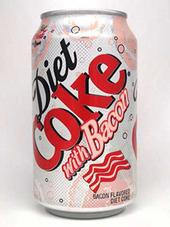Whither Bacon?
The following is my answer to the question “Why are some people obsessed with bacon?” on Quora

First, the technical answer: Bacon is a particularly umami packed foodstuff, making it almost universally delicious.
This means that, more than other meats, it can be combined with other flavours in interesting ways. An event like BaconCamp showcases its flexibility; bacon can enhance dishes both savoury and sweet.
But on a more base level, I think bacon’s popularity (and cultishness) is more tied to its emotional feeling. Bacon is cheap and easy to cook. You can buy a large pack from the supermarket for a few bucks, and prepare it by frying, grilling, broiling or microwaving. (If good quality steak was as cheap and easy-to-prepare as bacon, we’d probably see FiletMignonCamps sprouting up!)
In the US, bacon’s an integral part of most of the crazy-huge breakfasts served at diners and restaurants, so it gets internally associated with the times you’ve treated yourself to breakfast out. And in the UK, a bacon butty, usually with plenty of ketchup (also extremely umamiful), is standard fare for when you’re short of cash, hungover and/or lazy (ie. students eat them A LOT)
Because of these experiences, bacon is subconsciously tied to “comfort food” in our brains. Most people enjoy it, and vegetarians often comment that bacon is the one meat they miss. Since it’s a relatively-unspoken common bond, when it is brought to the fore in (primarily internet) culture, it’s something large numbers of people respond to with “Yeah! I love bacon too!” Amplify this in the standard internet hyperbole filter, and there’s your “obsession”.